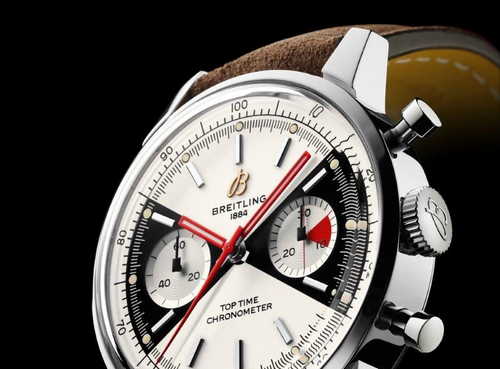The company has rereleased the watch, black and white «panda» face and all, to a new generation and it’s doing something a bit different this time. Instead of offering a certificate of authenticity, the company is registering each watch on a private blockchain that will follow its provenance from owner to owner.
The Breitling Top Time, pictured above, was a hand-wound chronograph from the 1960s popular with the Jet Set of the era. James Bond wore it in «Thunderball,» although his featured a miniature Geiger counter.
As such, it’s a rare example of an enterprise blockchain project that made its way to real-world deployment; most corporate dabbling with distributed ledgers has resulted in little more than hype.
«The Breitling Top Time Limited Edition will be the brand’s first watch offered with a blockchain-based digital passport, which confirms the authenticity and ownership of the watch with a single click,» the company said in a press release.
Breitling is using a blockchain from valuables registrar Arianee, a French company whose aim is to build «perpetual relationships between brands and owners.» The solution ties the watch’s warranty to the watch itself and not to any paper trail, allowing owners to have their pieces serviced by authorized dealers based on the watch’s digital signature.
The Arianee blockchain combines permissioned and permissionless elements through its use of a consensus mechanism it’s calling “proof-of-authority.” It is permissionless in the sense that users who want to sell products to one another can interact with the blockchain, but the verifying of the ledger and issuance of tokens is controlled by the participating businesses.
Breitling, founded in 1884, is being a good sport about the project, saying that the system allows users to «engage with the brand anonymously» and take part in «new online services ranging from advanced clienteling to a revolutionary care program.»
The watch nerd will note that the Top Time has a linear scale on its bezel instead of a tachymeter. This is called a decimal scale and was offered on some watches in the 1960s. It was, apparently, used for scientific timings, splitting each minute into 100 sections rather than the usual 60.

Luxury Car Manufacturer Begins Accepting Bitcoin for Vehicle Sales
California-based luxury electric car manufacturer Karma Automotive has begun accepting digital currency as a means of payment at one of its stores in Newport Beach.
Karma Newport Beach now enables customers to pay in Bitcoin for new vehicle purchases and related services, according to a company press release on Oct. 15. Announcing the new offering, Karma CEO Lance Zhou said:
“We are opening our platform to serve as a test bed to help convert theoretical blockchain applications to practical use. Karma’s flagship store will support our efforts to prove emerging technology and provide the latest VVIP customer treatment offerings by accepting Bitcoin cryptocurrency.”
The Chinese Wanxiang Group bought Karma’s assets from Fisker Automotive in 2014 for $149.2 million. It began building its flagship Revero vehicle in 2016, the new model of which retails for over $135,000. The Revero can reportedly travel 37 miles before needing a recharge.
Crypto and luxury goods
Cryptocurrency has found its way into the luxury goods industry, both in forms of function and payment. In September 2018, Swiss luxury watch brand Hublot released its “Big Bang Blockchain” watch that could exclusively be purchased with Bitcoin.
Other high-end timepieces from Franck Muller have integrated cryptocurrency wallets. Franck Muller’s crypto wallet watches retail from $9,800 to $50,600.
Blockchain technology in the automotive industry
Car manufacturers around the world have been experimenting with crypto’s underlying blockchain technology, with the Ford Motor Company looking into blockchain and geofencing to accurately track the number of “green miles” driven by its energy-efficient vehicles. BMW, General Motors, Ford, Renault and Honda started testing a blockchain car identification and payment system in the United States.
In September, Indian automobile manufacturer Tata Motors announced plans to apply blockchain solutions in various aspects of the automotive industry, including the parking marketplace, demand prediction algorithms and real-time monitoring of fuel quality.


